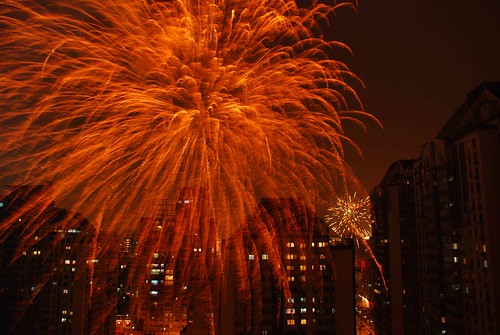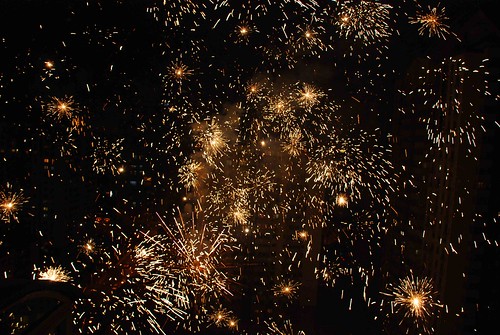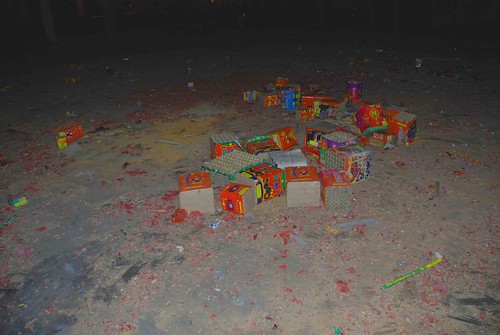As usual, Chinese New Year was not ushered in with a bang, but with an ever-growing apocalyptic crescendo of fire, sulfur and smoke. The New Year as it fits the lunar calendar happens at a slightly different time each year, but no matter where it lands, it’s a huge disruption in the ‘normal’ flow of things. Think Thanksgiving on steroids; during this year’s holiday, transportation authorities are expecting somewhere near three-billion person/trips as the entire country skips off work, goes home to see a few sets of relatives scattered in various provinces, and maybe finds the time to squeeze in a vacation sometime during the week. And this is on an infrastructure that’s already bursting at the seams.
This is without a doubt
On the last day of the lunar year, it is customary to spend the evening with family, eating a giant meal over the course of several hours. There are several dishes tied to the holiday, but the two most important are fish and dumplings. The word for fish rhymes with surplus, so you have to ‘have a surplus every year’. There’s probably some kind of similar reasoning behind the dumplings, but I don’t know it. Everyone stays up until midnight, when the year officially begins.
This is where the holiday becomes so utterly and uniquely Chinese. The changing of the year is a time when spirits of good fortune and calamity have a chance to influence your whole year, so it’s only natural that you should chose this time to play with fire.
Apparently ghosts and evil spirits are terrified of firecrackers, and if you let off enough of them, you can scare all your coming misfortune away. From what I saw last night,
If you haven’t taken part in this festival, you’re probably sitting there imagining a lion dance and little kids running around with firecrackers. That happens all right, but you have to remember that the Chinese invented gunpowder. They look at firecrackers, cherry bombs, roman candles and rockets as a nice little afterthought for the kids. The big guys play with mortars. Mortars. The big ones, some of them big enough to be part of a large professional fire show. This is what was selling on streetcorners all over
For the past several nights, the lights and sounds of the pyromaniacs echoed across the night sky like an indecisive thunderstorm, not sure whether or not to enter the city. Then, on the day of New Year’s Eve, the sounds got louder, closer and more frequent. This is nice, we thought. Being quite at home in China, I had an inkling that we were in for a good show on our 18th floor balcony, but I had never done New Year’s in Beijing before, and I had no idea how cool it was going to be. As the sky grew dark, the rumbling got louder and louder, with each explosion bouncing around between the buildings and setting off car alarms left and right. We could see mortars exploding in the foreground, behind the first rows of buildings, and way off on the edges of town. The ones we couldn’t see hinted at their presence with flashes lighting up buildings and patches of sky in each direction.
We sat down for dinner at about eight, interrupted frequently by a rush outside to watch a particularly large burst. By the time we finished around ten, it had grown to a constant barrage. We set off a few roman candles and a mortar series from the balcony for good measure. When it was twelve, the city was bright as day, as thousands upon thousands of mortars were lit off repeatedly and passionately from every non-flammable patch of land in the capital.
Normally at this point in the cliché, the next sentence would start with “when the smoke cleared”, but it didn’t. The barrage slowed down a little bit, but didn’t die down. An hour later, there were still explosions in every corner of the sky, and smoke hanging over everything.
We decided it was as good a time as any to go for a drive through town, so we did. As we made our way through, much of the city was oddly quiet while the bombs burst overhead. Every streetcorner was covered in the debris, ash and paper, which at some points was piled several feet high.
Judging by the trash everywhere, the real place to do up Chinese New Year is in the hutongs, the old streets of inner
We went to a party, which was deserted. It doesn’t really matter anyway. Last night I found out a few things. First, this holiday is becoming more important to me than I thought it would. Second,
Happy New Year!



No comments:
Post a Comment